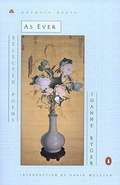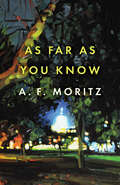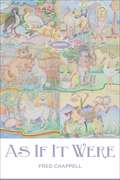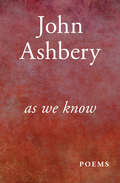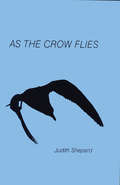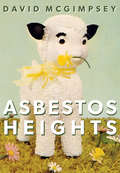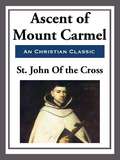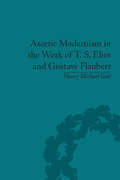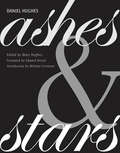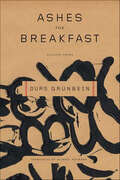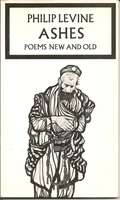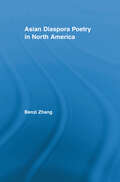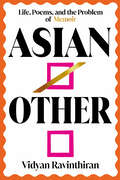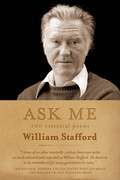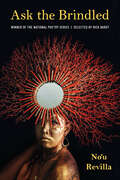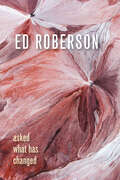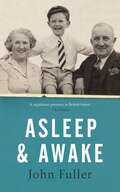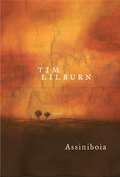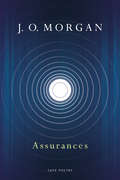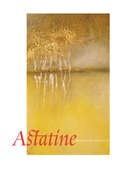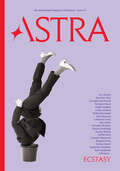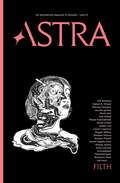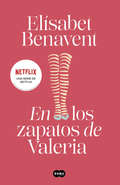- Table View
- List View
As Ever
by Joanne KygerThis collection of Joanne Kyger's work reveals her as one of the major experimenters, hybridizers, and visionaries of poetry. Kyger is a poet of place, with a strong voice-delicate, graceful, and never wasteful; her poems explore themes of friendship, love, community, and morality and draw on Native American myth as well as Asian religion and philosophy. Kyger's love for poetry manifests itself in a grander scheme of consciousness-expansion and lesson, but always in the realm of the everyday. Edited with a foreword by Michael Rothenberg, and with an introduction by poet David Meltzer, this book is a marvelous overview of a wonderfully challenging and important poet. .
As Far As You Know
by A.F. MoritzFrom one of the defining poets of his generation, a new collection that plumbs the depth of beauty, history, responsibility, and love.As Far As You Know, acclaimed poet A. F. Moritz’s twentieth collection of poems, begins with two sections entitled “Terrorism” and “Poetry.” The book unfolds in six movements, yet it revolves around and agonizes over the struggle between these two catalyzing concepts, in all the forms they might take, eventually arguing they are the unavoidable conditions and quandaries of human life.Written and organized chronologically around before and after the poet’s serious illness and heart surgery in 2014, these gorgeously unguarded poems plumb and deepen the reader’s understanding of Moritz’s primary and ongoing obsessions: beauty, impermanence, history, social conscience and responsibility, and, always and most urgently, love. For all its necessary engagement with worry, sorrow, and fragility, As Far As You Know sings a final insistent chorus to what it loves: “You will live.”
As If It Were: Poems
by Fred ChappellInspired by ancient, modern, and contemporary writings, Fred Chappell’s sprightly new collection of verse, As If It Were, presents tales, anecdotes, pointed stories, and aphorisms to spark the conscience of readers young and old. Playful and even zany, the humor in these poems pulls readers into a world filled with noble lions, crafty foxes, predacious wolves, longsuffering asses, and fashionable peacocks. Chappell illustrates how the fable offers a timeless form of wisdom, surprising us with revelations that challenge what we think we already know, along with fresh observations of daily experiences. With its informal, even nonchalant tone of address and lush, polished language, As If It Were endows homespun materials with alchemical insights.
As We Know: Poems
by John AshberyDating from one of the most studied creative periods of John Ashbery&’s career, a groundbreaking collection showcasing his signature polyphonic poem &“Litany&” First published in 1979, four years after Ashbery&’s masterpiece Self-Portrait in a Convex Mirror, the poems in As We Know represent the great American poet writing at the peak of his experimental powers. The book&’s flagship poem, the seventy-page &“Litany,&” remains one of the most exciting and challenging of Ashbery&’s career. Presented in two facing columns, the poem asks to be read as independent but countervailing monologues, creating a dialogue of the private and the public, the human and the divine, the real and the unreal—a wild and beautiful conversation that contains multitudes. As We Know also collects some of Ashbery&’s most witty, self-reflexive interrogations of poetry itself, including &“Late Echo&” and &“Five Pedantic Pieces&” (&“An idea I had and talked about / Became the things I do&”), as well as a wry, laugh-out-loud call-and-response sequence of one-line poems on Ashbery&’s defining subject: the writing of poetry (&“I Had Thought Things Were Going Along Well / But I was mistaken&”). Perhaps the most admired poem in this much-discussed volume is &“Tapestry,&” a measured exploration of the inevitable distance that arises between art, audience, and artist, which the critic Harold Bloom called &“an &‘Ode on a Grecian Urn&’ for our time.&” Built of doubles, of echoes, of dualities and combinations, As We Know is the breathtaking expression of a singular American voice.
As horas são euros atirados a um banco
by Mois BenarrochÚltimo livro de Benarroch em Espanhol, com poemas curtos, alguns deles publicados directamente no Twitter nos últimos anos.
As the Crow Flies
by Judith ShepardA collection of poems by Judith Shepard, co-publisher at The Permanent Press.
Asbestos Heights
by David McgimpseyIf you tore off the tops of canola -- yellow canola flowers -- would you jump in a tub of canola margarine just to make the best of despair? Implored by concerned readers to be 'classy’ and 'real’ for once, David McGimpsey has composed a sequence of canonical notebooks on all things 'poetic’ and 'poetical. ’ Birds! Flowers! History! Sad leaders! The word 'aubade’! They’re all here, in a serial, State Fair-bound collection of lyrics set in the workingclass belvedere of Asbestos Heights. Among the refreshing lemonlime sodas of the world and the rousing lyrics to 'Bootylicious,’ Asbestos Heights amps up McGimpsey’s trademark sideswiping of formal rhetoric and prosody with pop savoir faire to ?nd his boldest collection. Imagine Petrarch in a Tweet war about where to buy a good pair of dad jeans. Imagine Yeats but with a lot fewer swans. Imagine a poet who was told long ago that nothing good ever comes out of a place like Asbestos Heights. 'David McGimpsey is unfuckwithable, poetry-wise, and I'll stand on John Ashbery's coffee table in my cowboy boots and say that. ' -- Michael Robbins David McGimpsey is the author of several books of poetry and short fiction. His poetry has been shortlisted for the Governor General's Literary Award and the A. M. Klein Prize. He is also a musician, a fiction editor for Joyland, and his travel writing is a regular feature of enRoute magazine. He lives in Montréal, where he teaches creative writing and literature at Concordia University.
Ascent Of Mount Carmel
by St. John of the CrossI remained, lost in oblivion; My face I reclined on the Beloved. All ceased and I abandoned myself, Leaving my cares forgotten among the lilies." Thus writes 16th century Spanish poet and mystic, St. John of the Cross. In this, his third work, the author reflects on the nature of a personal union with Christ, found in the abandonment of self.
Ascetic Modernism in the Work of T S Eliot and Gustave Flaubert
by Henry Michael GottGott examines Eliot’s The Waste Land (1922) in conjunction with Gustave Flaubert’s La Tentation de Saint Antoine (1874). He provides a highly original reading of both texts and argues that a stylistic affinity exists between the two works.
Ashes & Stars
by Edward Hirsch Daniel Hughes Mary Hughes Michael ScrivenerFifty-five of Daniel Hughes's final poems, containing distinctly insightful and literate meditations on themes of love, art, and hope.
Ashes for Breakfast: Selected Poems
by Durs GrünbeinThe first English translation of Germany's leading contemporary poet....what is the whole surreal jokeshopof terrors compared to theinfinitely chance littletricks of a poem.--from "MonoLogical Poem #1"Born in Dresden in 1962, Durs Grünbein is the most significant and successful poet to emerge from the former East Germany, a place where, he wrote, "the best refuge was a closed mouth." In unsettling, often funny, sometimes savage lines whose vivid images reflect his deep love for and connection with the visual arts, Grunbein is reinventing German poetry and taking on the most pressing moral concerns of his generation. Brilliantly edited and translated by the English poet Michael Hofmann, Ashes for Breakfast expertly introduces Germany's most highly acclaimed contemporary poet to American readers.
Asian Diaspora Poetry in North America (Literary Criticism and Cultural Theory)
by Benzi ZhangPresenting a new way of reading that helps us discern some previously unnoticed or unnoticeable features of Asian diaspora poetry, this volume highlights how poetry plays a significant role in mediating and defining cross-cultural and transnational positions. Asian diaspora poetry in North America is a rich body of poetic works that not only provide valuable material for us to understand the lives and experiences of Asian diasporas, but also present us with an opportunity to examine some of the most important issues in current literary and cultural studies. As a mode of writing across cultural and national borders, these poetic works challenge us to reconsider the assumptions and meanings of identity, nation, home, and place in a broad cross-cultural context. In recent postcolonial studies, diaspora has been conceived not only as a process of migration in which people crossed and traversed the borders of different countries, but also as a double relationship between different cultural origins. With all its complexity and ambiguity associated with the experience of multi-cultural mediation, diaspora, as both a process and a relationship, suggests an act of constant repositioning in confluent streams that accommodate to multiple cultural traditions. By examining how Asian diaspora poets maintain and represent their cultural differences in North America, Zhang is able to seek new perspectives for understanding and analyzing the intrinsic values of Asian cultures that survive and develop persistently in North American societies.
Asian/Other: Life, Poems, and the Problem of Memoir
by Vidyan RavinthiranA perceptive exploration of poetry, race, and otherness from one of our most promising voices in criticism. Vidyan Ravinthiran was born in the north of England to Sri Lankan Tamils, and moved to the United States five years ago. Considering identity in both its political and psychological senses, he leaps adventurously between memoir and criticism, understanding his life through poetry, and vice versa. Ranging from Andrew Marvell to Divya Victor, Ravinthiran writes both about and through poems, discussing Sri Lanka; experiences of racism and resilience; intergenerational trauma; pandemic parenting in an autism family; relationships shaped by the internet; growing up with a speech impediment and being sent by one’s aspirational brown parents to elocution lessons; and the relative invisibility of South Asians in Western television and film. This electric, compelling hybrid memoir discovers a new way of writing about the self and also literature.
Ask Me: 100 Essential Poems of William Stafford
by William Stafford"In our time there has been no poet who revived human hearts and spirits more convincingly than William Stafford." —Naomi Shihab NyeSome time when the river is ice ask memistakes I have made. Ask me whetherwhat I have done is my life. —from "Ask Me"In celebration of the poet's centennial, Ask Me collects one hundred of William Stafford's essential poems. As a conscientious objector during World War II, while assigned to Civilian Public Service camps Stafford began his daily writing practice, a lifelong early-morning ritual of witness. His poetry reveals the consequences of violence, the daily necessity of moral decisions, and the bounty of art. Selected and with a note by Kim Stafford, Ask Me presents the best from a profound and original American voice.
Ask the Brindled
by No'u RevillaAsk the Brindled, selected by Rick Barot as a winner of the 2021 National Poetry Series, bares everything that breaks between “seed” and “summit” of a life—the body, a people, their language. It is an intergenerational reclamation of the narratives foisted upon Indigenous and queer Hawaiians—and it does not let readers look away. In this debut collection, No‘u Revilla crafts a lyric landscape brimming with shed skin, water, mo‘o, ma‘i. She grips language like a fistful of wet guts and inks the page red—for desire, for love, for generations of blood spilled by colonizers. She hides knives in her hair “the way my grandmother—not god— / the way my grandmother intended,” and we heed; before her, “we stunned insects dangle.” Wedding the history of the Kingdom of Hawai?i with contemporary experiences of queer love and queer grief, Revilla writes toward sovereignty: linguistic, erotic, civic. Through the medium of formal dynamism and the material of ?Oiwi culture and mythos, this living decolonial text both condemns and creates. Ask the Brindled is a song from the shattered throat that refuses to be silenced. It is a testament to queer Indigenous women who carry baskets of names and stories, “still sacred.” It is a vow to those yet to come: “the ea of enough is our daughters / our daughters need to believe they are enough.”
Asked What Has Changed (Wesleyan Poetry Series)
by Ed RobersonA Black ecopoet observes the changing world from a high-rise window, &“ever alert to affinities between the small and the vast, the fleeting and the cosmic&” (James Gibbons, Hyperallergic). Award-winning poet Ed Roberson confronts the realities of an era in which the fate of humanity and the very survival of our planet are uncertain. Departing from the traditional nature poem, Roberson's work reclaims a much older tradition, drawing into poetry&’s orbit what the physical and human sciences reveal about the state of a changing world. These poems test how far the lyric can go as an answer to our crisis, even calling into question poetic form itself. Reflections on the natural world and moments of personal interiority are interwoven with images of urbanscapes, environmental crises, and political instabilities. These poems speak life and truth to modernity in all its complexity. Throughout, Roberson takes up the ancient spiritual concern—the ephemerality of life—and gives us a new language to process the feeling of living in a century on the brink.
Asleep and Awake
by John FullerAn elegantly jubilant and personal new collection celebrating love, life and creativity from award-winning poet and Booker Prize-shortlisted novelist, John FullerIn this personal and characteristically brilliant new collection from John Fuller, an abundance of memories abound. From “those once endless years” of a childhood in wartime – tasting of Granny’s chicken soup, twizzers and cherry-go-rips – to the pattern of family and friendships, important milestones are brought to vivid life. In ‘Before We Met – and After’ a sequence of recollections cherish a wife on her eightieth birthday; ‘In Whose Head’ a piece by Schumann is revisited through advancing years; and in ‘Keeper of the Fire’ and ‘In Memory of John Bayley’ late poems of remembrance memorialise lost friends. These are poems of being and time, full of lyric feeling and Fuller’s distinctive wit and lightness of touch. Alive with the clang and sway of the “chosen colours of daily family life”, together they form a resonant gathering of poems that celebrate, with thoughtfulness and joy, “the feel and length of our lives”.
Assiniboia
by Tim LilburnFrom Governor General's Award-winning poet Tim Lilburn comes a new collection of poetry of great scope and ambition. Assiniboia is a richly textured imagining of a Western Canada that could have been. Theatrical, operatic -- a masque and a pair of choral performances -- the book breaks new formal ground in Canadian poetry. The huge spectacle of Tim Lilburn's eighth collection gives us a new land peopled by figures from the visionary governments of Louis Riel and from the western mysticism, as well as land forms with the power of speech, all acting together as a kind of ghostly army bent on overturning more than a century of colonial practice.
Assurances
by J. O. Morgan**WINNER OF THE COSTA POETRY AWARD 2018****SHORTLISTED FOR THE 2018 FORWARD PRIZE FOR BEST COLLECTION**A war-poem both historic and frighteningly topical, Assurances begins in the 1950s during a period of vigilance and dread in the middle of the Cold War: the long stand-off between nuclear powers, where the only defence was the threat of mutually assured destruction.Using a mix of versed and unversed passages, Morgan places moments of calm reflection alongside the tensions inherent in guarding against such a permanent threat. A work of variations and possibilities, we hear the thoughts of those involved who are trying to understand and justify their roles. We examine the lives of civilians who are not aware of the impending danger, as well as those who are. We listen to the whirring minds of machines; to the voice of the bomb itself. We spy on enemy agents: always there, always somewhere close at hand.Assurances is an intimate, dramatic work for many voices: lyrical, anxious, fragmentary and terrifying; a poem about the nuclear stalemate, the deterrent that is still in place today: how it works and how it might fail, and what will vanish if it does.
Astatine
by Michael KenyonAstatine is an Italian girl, who like Dante's Beatrice, haunts the narrator of Michael Kenyon's incandescent fourth book of poetry. Named after a radioactive element whose isotopes endure half-lives of mere seconds, she is simultaneously a disappearing and abiding presence who cajoles and comforts, who questions and points, who often leaves the poet puzzled, electrified, heart-broken, and wanting more. Astatine is Kenyon's meditation on the evanescent and persevering tragedy of our lives on Earth. He takes us on an inspirational journey through time that embraces all we are born to and must too soon let go of, even as we make peace with the ever-changing fortunes of existence, even as we come upon unexpected joy.
Astitva ki Asmita: अस्तित्व की अस्मिता
by Dr Ghanshyam Asudaniअस्तित्व की अस्मिता विभिन्न सामाजिक मुद्दों पर आधारित 18 हिंदी लघु कथाओं का संग्रह है। लेखक ने महिलाओं के विशेष संदर्भ में समाज के कमजोर वर्गों के शोषण को प्रदर्शित करने का प्रयास किया है। कहानियाँ विभिन्न सामाजिक मुद्दों को सबसे संवेदनशील तरीके से प्रस्तुत करती हैं।
Astra Magazine, Ecstasy: Issue One
by Nadja SpiegelmanAstra Magazine is the new literary magazine of the moment, a must-read for anyone interested in the most vital contemporary literature from around the world. Astra Magazine connects readers and writers from New York to Mexico City, Lagos to Berlin, Copenhagen to Singapore and beyond around a unified aesthetic that highlights the luxurious pleasures of reading. Each issue contains prose, poetry, art and comics, artfully produced on silky smooth paper with luxurious French flaps. The Ecstasy Issue contains work by Mieko Kawakami, Fernanda Melchor, Catherine Lacey, Leslie Jamison, Solmaz Sharif, Terrance Hayes, Don Mee Choi, Ada Limón, Chinelo Okparanta, Sayaka Murata, Katharina Volckmer, Kate Zambreno, and many more.
Astra Magazine, Filth: Issue Two
by Nadja SpiegelmanAstra Magazine is the new literary magazine of the moment, a must-read for anyone interested in the most vital contemporary literature from around the world. Astra Magazine connects readers and writers from New York to Mexico City, Lagos to Berlin, Copenhagen to Singapore and beyond. Each issue contains prose, poetry, art and comics, artfully produced on silky smooth paper with luxurious French flaps. It's the most covetable accessory of the fall — dark and playful, pretty and smart. The Filth issue features work by Elif Batuman, Sheila Heti, Raven Leilani, Aracelis Girmay, Samuel R. Delany, Brontez Purnell, Wayne Koestenbaum, Clarice Lispector, McKenzie Wark, Mariana Enríquez, Safiya Sinclair, Maggie Millner, and many more.There is a moral element to filth. It is both what we have been taught to hide, and the subversive pleasure in revealing it. Many of the writers in this issue are queer or trans or otherwise outsiders. When you are taught that an intrinsic part of you is shameful, you find power in that shame. All that filth, compressed by the pressure, sparkles like diamonds when it is let it into the light. Have you ever felt the relief of telling your own secrets? There&’s a reason why people revel in their own filth. It&’s a place for reveling
Astro Poets: Tu guía del Zodiaco
by Dorothea Lasky Alex DimitrovEl primer gran manual de astrología del siglo XXI es divertido y útil, está salpicado de versos, contiene un mundo para cada signo y ¡llega de la mano del fenómeno Astro Poets! Si alguna vez te has preguntado por qué tu amiga géminis no te deja mediar palabra cuando salís a tomar algo, cuándo el «¿Sigues despierto?» que te escribe esa escorpio a las dos de mañana se convertirá en algo más (spoiler: no va a pasar), o cómo es que tu novio cáncer se deshace en lágrimas con los anuncios de pañales, estás en el lugar adecuado. En estas páginas llenas de grandes dosis de información, consejos, humor, lirismo y poesía, los Astro Poets te ayudarán a leer lo que han escrito las estrellas sobre ti para que lo uses a la hora de lidiar con tus amistades, tu carrera y tu complicada (¡o no!) vida amorosa. La crítica ha dicho...«Los Astro Poets iluminan internet.»The New York Times «Una guía deastrología como no has visto otra igual.»Bustle «Dimitrov y Lasky saben de lo que hablan y tienen un don para hacer que el etéreo mundo de la astrología parezca claro y cercano.»Vogue «Los lectores que quieran saber más sobre su signo quedarán encantados con este espléndido manual.»Publishers Weekly «Ha surgido una nueva voz popular en el firmamento del horóscopo, y tiene algo de la sensibilidad de Piscis y de la férrea autoestima de Leo, y es ingeniosa y amorosa.»Elle «El mapa astrológico definitivo... Un curso intensivo perfecto para principiantes, a la vez lírico, ingenioso y con el conocimiento suficiente para cautivar incluso a los ya iniciados.»Booklist «Una guía de signos divertida, accesible y supermoderna. Ricemos el rizo, ¡es astrología escrita por poetas! Si alguna vez te has preguntado qué dice tu horóscopo de ti (o cómo puede ayudarte a entender a los que te rodean), deberías empezar por aquí.»BookRiot
